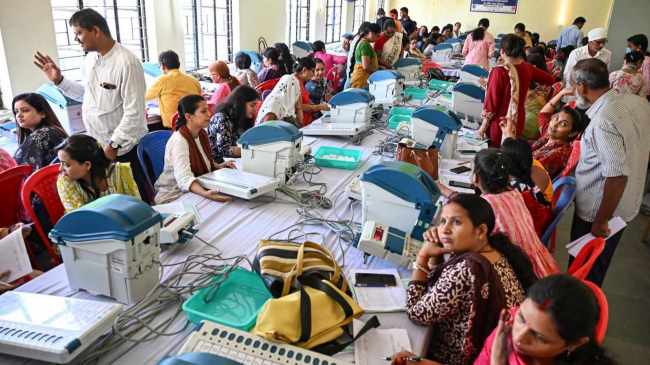After a Special Intensive Revision (SIR), only 315 foreign nationals were found in Bihar’s voter list — 78 Muslims and the rest Hindu Nepali citizens. The data challenges BJP’s claims of large-scale infiltration.
By Dr. Mohammad Farooque | Qalam Times News Network
Patna / Kolkata | October 13, 2025
Foreign Nationals Found Fewer Than Expected After Bihar Voter Roll Audit
The number of foreign nationals in Bihar’s voter list has been pegged at just 315 following the Election Commission’s Special Intensive Revision (SIR). According to Aam Aadmi Party (AAP) MP Sanjay Singh, the detailed verification revealed that 78 of these individuals are Muslims, while the remaining are Hindu citizens from Nepal.
Singh argued that the figures demolish the narrative of “mass infiltration” or manipulation in Bihar’s electoral rolls — a claim often pushed in political discourse.
Sanjay Singh Calls BJP’s Claims ‘False Propaganda’
In a video statement, Singh accused the Bharatiya Janata Party (BJP) of “spreading lies and communal misinformation” for electoral gain. “After the Election Commission’s Special Intensive Revision, the truth is out — only 315 foreign nationals exist on Bihar’s voter list,” he said.

He added that this data “completely busts the fake propaganda” being used to divide communities ahead of upcoming elections.
The Election Commission of India (ECI) conducted the SIR to identify ineligible, duplicate, or non-citizen voters across all districts of Bihar.
Kishanganj: Only Two Suspected Non-Citizens — Both Retained
In Kishanganj, Bihar’s only district bordering both West Bengal and Nepal, the final report showed that only two electors were flagged as suspected non-citizens — and even they were retained in the final roll.
The SIR, which began on June 24, involved a complete re-enumeration of voters rather than the usual annual revision. Out of 7.89 crore registered voters, about 65 lakh names were deleted due to reasons such as death, migration, or duplication.
In Kishanganj, 1,905 deletion applications were submitted — but only two (0.01%) cited “not Indian citizen” as the reason. Interestingly, both objections were self-filed by the voters themselves and later dismissed by election officials, who confirmed their citizenship.
Political Reactions and Economic Context
Reacting to the findings, Kishanganj Congress MP Mohammad Jawed questioned the BJP’s timing:
“Why do they remember infiltration only during elections? Our region’s per capita income is $250 — no one would want to migrate here from Bangladesh, where it’s $2,700.”
Meanwhile, local BJP leader Gopal Mohan Singh defended the SIR, calling it “necessary to clean the voter list,” though he maintained that “infiltration” had increased in border areas.
Despite such claims, official data from the SIR shows no deletions based on non-citizenship in any part of the district — reinforcing the accuracy of the electoral rolls.
The final SIR data paints a clear picture: claims of mass infiltration in Bihar have little factual basis. With only 315 foreign nationals found across the state — and a mere two cases in the sensitive border district of Kishanganj — the political narrative around voter-list infiltration appears significantly overstated.







